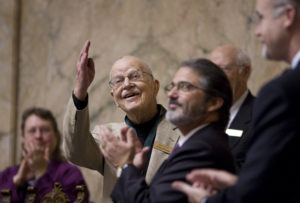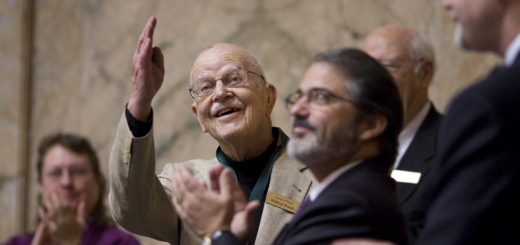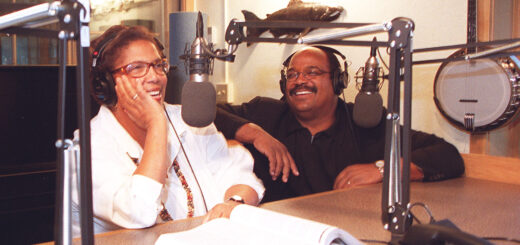Wilfred R. Woods, long-time publisher, dies at 97
By Mike Irwin
World Staff Writer
WENATCHEE — Wilfred R. Woods died Saturday at age 97, ending his nine decades of wandering the world and wondering tirelessly about how it worked.
Preferring the nickname “Wilf,” the newspaperman, family patriarch, avid outdoorsman, art philanthropist and expert whistler died at home from complications of old age and new ailments. Arthritis in his knees had slowed him in recent months to finally allow heart and pulmonary conditions to catch up.
A globe-trotting reporter, columnist and former publisher of The Wenatchee World — the newspaper his family has owned since 1907 — Woods regularly touched the lives of thousands of readers and North Central Washington residents through his writing and passionate interests in art, music, theater, history, travel, politics, science and the creative people who made those happen.
By Monday, praise for the nonagenarian was pouring in from arts, business and civic leaders around the Northwest. Wenatchee’s Pybus Public Market flew the flag at half-mast in Woods’ honor.
Woods’ passing brought an end to his brand of old-style reporting that bore personal witness to events that, through the decades, stunned the world and rocked the region. He reported first-hand on the Berlin Airlift (1948-49), Beijing’s crisis at Tiananmen Square (1989) and the rise of oil powers in the Middle East (1970s and 80s). Back home, his NCW beat produced stories on sweeping economic and social transformations that turned sleepy Central Washington into a hydroelectric and agricultural force.
“All I’ve got to say,” he told a reporter in 2014, “is that I’ve lived in interesting times. I’m thankful for that.”
Big headlines aside, Wenatchee World readers likely know Woods for his frequent front-page column, “Talking It Over,” and his gee-whiz inquiries into topics that fascinated, delighted or irked his probing mind. Subjects ranged from the highly personal (childhood memories, the death of his father Rufus Woods) to political endorsements (Henry “Scoop” Jackson for U.S. senator in 1952) to musings on downhill skiing and the opening of Mission Ridge (1966).
In the last decade, Woods often focused his column on everyday incidents and situations. Recent writings questioned the use of anti-bacterial soap, touted a Japanese brand of less-fatty beef, detailed the domestication of dogs and postulated that Almond Roca is the best-tasting candy. His last column, dated Dec. 12, enthused over new exercises to soothe his arthritic knees.
Woods’ rampant curiosity was perhaps most evident on a recent tour of his Wenatchee World office, where on the walls Native American artworks mixed with African textiles; a desktop was covered in magazines about archaeology, physics, forestry, the economy and world politics; and books — filling shelves and stacked high — included titles on Sicily, Lawrence of Arabia, war in the Pacific Islands, vintage trains, the importance of non-conformists and dozens of other topics.
Almost every workday and many weekends, Woods ambled to his office — most recently using a cane with a built-in flashlight — for long periods of reading and writing interspersed with naps. He alerted newsroom staff of his arrival by whistling sprightly tunes and sometimes burst into song. He often led rousing renditions of “Happy Birthday” at office parties celebrating employees on their birth dates.
His penchant for the outdoors surfaced regularly in his front-page writings. A sampling of his adventures included hiking in the mountains west of Kathmandu, Nepal; 40 years of hikes and pack trips into the North Cascades with members of the Courtney family in Stehekin; hitting the state’s ski slopes in 1935, years before rope tows and chairlifts were common fixtures; skiing at Stevens Pass in the 1930s — before completion of Highway 2 in 1939 — when it meant most people up there were from the Wenatchee Valley.
Born in Wenatchee on Sept. 30, 1919, Woods was the newest addition to a newspaper family headed by his father and firebrand publisher Rufus Woods, a fierce advocate of development in North Central Washington and a key proponent of the building of Grand Coulee Dam and development of the Columbia Basin Project.
As a boy, Wilf Woods had a penchant for exploration and adventure, a curiosity about the world that stood him well in the family newspaper business. He also demonstrated a talent for music that helped spur his lifelong interest in all varieties of tunes and compositions.
His first job at The World was swatting flies in the newspaper’s production room. With no air-conditioning, the heat was unbearable in the room, he said, so windows remained open and the flies buzzed in. “I was very young,” he recounted three years ago, “but I learned that the job was important because the flies were simply awful. A detail that needed tending to.”
During high school, Woods signed on as an apprentice typesetter and printer. He used those skills after graduation to learn stereotyping, a form of hot-type printing, when unionized printers walked off the job in an argument with World management.
“I learned stereotyping the hard way,” he said, “I dove right in and applied myself.” It was a learning model he followed for much of his life.
Woods attended three years of college before the start of World War II. He joined the U.S. Army Air Corps and served more than three years (1942-46) at Edwards Air Force Base in California as a sergeant of clerical duties for one of the military’s first jet groups. He then returned to college — the University of Washington — and graduated in 1947 with a degree in history.
He immediately returned to Wenatchee to work as a World reporter, duties that included coverage of NCW’s devastating floods of 1948. Later that year, he was accredited as a foreign correspondent and embarked for Europe. He lived in Paris, learned a smattering of French, and sent many dispatches during two years overseas.
In 1950, while visiting hydroelectric facilities in Toronto, the elder Rufus Woods suffered a debilitating heart attack and died in that Canadian city.
Wilf Woods immediately inherited the paper and served as editor and publisher for 47 years. “Luckily, I also inherited a really good crew who could basically operate the paper until I learned the ropes,” he said.
In the following year, he met Kathy Kingman, a native of Chelan and office worker for the Lake Chelan Chamber of Commerce. He asked her on a date — a long drive and short hike to the top of 7,440-foot Slate Peak near Mazama — and then to a Wenatchee Chiefs baseball game.
“Imagine those as your first two dates,” she laughed. “I knew there was something different about this guy. I saw something in him.” They dated for five months and were married Dec. 1, 1951. They celebrated their 65th anniversary in December.
The Woods had three children — Kara, then Rufus, followed by Gretchen. “After that, I was a full-time mom,” said Kathy.
The decades to follow — the 1950s, ‘60s and ‘70s — were industrious times, Woods noted in a later interview. Alcoa built its smelter in Malaga, water flowed for the first time in canals of the Columbia Basin Project and dams were under construction by the Chelan and Douglas county public utility districts.
“The dams were the lifelines for our growing orchard industry, from Wenatchee to Oroville,” Woods said. “These dams did for our apple-growing regions what Grand Coulee Dam did for the Columbia Basin.”
In 1997, Woods retired as publisher to serve as chairman of the newspaper company’s board of directors. His son Rufus took the helm and has run the newspaper since.
After newspapering and family, Woods’ primary love was music and arts. In 1974-75, he helped organize Friends of the Music and was active with the group for 15 years in bringing chamber music to the area.
In the 1990s, Wilf and Kathy created the Woods House Conservatory of Music in Wenatchee, and later sang with the Columbia Chorale (Wilf as bass, Kathy as alto) and in the Lake Chelan Bach Fest.
During those years, Wilf Woods helped form a coalition to fund and build the Wenatchee Performing Arts Center, played a major role in establishing the Icicle Center for the Arts in Leavenworth and promoted the construction of the Wenatchee Valley College Music and Arts building, which includes The Grove recital hall.
Even in his 90s, Woods strode each day 1.5 miles from his office to the World’s production plant. There, he’d fetch that day’s freshly-printed edition right off the press to be one of that issue’s first readers.
A reporter once asked Woods — then 95 years old — if those daily walks were the secret to his longevity, if they helped ward off the inevitable date with death. He admitted that the walks kept him fit and alert, but that they also got him outside in all kinds of weather to see what the world had to offer that day.
As for dying? “That’s life,” he chuckled. “That’s the way life goes.”




